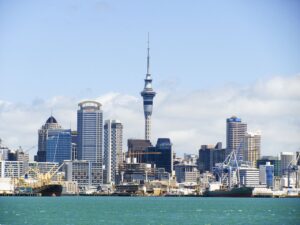New Zealand citizenship offers a gateway to a fulfilling and prosperous life in this picturesque island nation.
With its location in the southwestern Pacific Ocean, many tourists know New Zealand for its stunning natural beauty, diverse landscapes, and high quality of life. Its population of approximately five million people is warm and welcoming disposition.
The majority of New Zealanders are of European descent. But the nation also embraces a rich Māori heritage, with the Māori people being the indigenous Polynesian inhabitants.
So, in this guide, we’ll explain everything you need to know about becoming a New Zealand citizen. Including the different pathways available, and how to apply for a resident visa and passport.
Benefits of New Zealand Citizenship
Lifestyle
New Zealand’s balanced and high quality of life is one of its many lifestyle characters. While similar to its neighboring Australia, some key aspects of the New Zealand lifestyle are unique to the island nation. These include:
- Outdoors: New Zealanders have a strong affinity for the outdoors. The country’s breathtaking natural beauty provides ample opportunities for outdoor activities. This outdoor orientation contributes to a generally active and healthy lifestyle.
- Balance: New Zealanders place a high value on work-life balance. With a standard employment workweek of around 40 hours and generous annual leave allowances, individuals have time to enjoy leisure activities, spend with family, and pursue personal interests.
- Progressive: New Zealand has a reputation for being socially progressive. It was one of the first countries to grant women the right to vote in 1893. It also has a history of championing human rights and equality.
- Education: New Zealand offers a high standard of education and healthcare. The education system is excellent, and there are numerous world-class universities and institutions. The healthcare system provides universal access to medical services, ensuring the well-being of citizens.
- Safety: Most people know New Zealand for its low crime rates and many consider it one of the safest countries in the world. This sense of safety contributes to a relaxed and peaceful lifestyle.
- Culture: While English is the predominant language, New Zealand celebrates its cultural diversity. The Māori culture, in particular, holds a significant place in the nation’s identity. This rich cultural tapestry reflects in art, cuisine, festivals, and daily life.
- Community: New Zealanders often have a strong sense of community. Whether in urban or rural areas, there is a tendency to look out for one another, contributing to a supportive and close-knit society.
Quality Of life
New Zealand boasts an exceptional quality of life, consistently ranking high in global quality of life indices. Its stunning natural landscapes, including lush forests, pristine beaches, and majestic mountains, contribute to a clean and healthy environment. This abundant natural beauty fosters a culture of outdoor activities, promoting physical well-being and mental health.
The country places a strong emphasis on education and healthcare. New Zealand offers a world-class education system, known for its inclusivity, high standards, and innovation. Additionally, the healthcare system provides universal access to quality medical services, ensuring the well-being of its citizens.
The socio-political climate in New Zealand benefits from stability, low levels of corruption, and a commitment to human rights. The country is a leader in progressive policies, including marriage equality and a strong focus on environmental sustainability.
New Zealanders enjoy a work-life balance that is the envy of many nations. With reasonable working hours and a culture that values leisure time and family, individuals have the opportunity to lead fulfilling lives outside of their professional obligations.
Furthermore, the low population density contributes to a sense of space and tranquility, even in urban areas. This fosters a sense of safety and security, with New Zealand consistently ranking as one of the safest countries in the world.
Overall, New Zealand’s quality of life encompasses natural beauty, excellent healthcare and education systems, political stability, work-life balance, and a strong sense of community, making it an enviable place to live.
Business freedom
As one of the strongest Australasian nations, New Zealand has a high degree of business freedom. The country consistently ranks near the top in global indices that measure economic freedom and ease of doing business.
It has a relatively transparent and efficient regulatory environment for businesses. The government implements policies aimed at reducing bureaucratic red tape and streamlining procedures for starting and operating businesses.
This encourages innovation and entrepreneurship through various support programs, research initiatives, and funding opportunities for startups and businesses looking to expand. As a result, the open economy has few barriers to international trade and investment. This allows businesses to access a wide range of markets and opportunities domestically and internationally.
English language
New Zealand’s history with the English language is intertwined with its colonial past and subsequent cultural evolution. The English language was introduced to New Zealand by British settlers during the early 19th century.
The signing of the Treaty of Waitangi in 1840 between the British Crown and Māori chiefs marked a pivotal moment in New Zealand’s history. This treaty, which was written in both English and Māori, established British sovereignty over New Zealand while guaranteeing certain rights to the Māori people.
Over time, English became the dominant language, particularly in official and administrative contexts. However, the Māori language (te reo Māori) remained an integral part of New Zealand’s cultural heritage. Efforts have been made to revitalize and preserve the Māori language and culture. It is now an official language of New Zealand.
In recent decades, there has been a growing recognition of the importance of cultural diversity and the contributions of various ethnic communities. This has led to the recognition of other languages spoken in New Zealand, including Pacific Island languages, Chinese, Hindi, and others, alongside English and Māori.
Today, English is the primary language of communication in New Zealand, used in education, government, media, and everyday life. The country’s unique linguistic history reflects its multicultural society and ongoing efforts to value and preserve diverse linguistic traditions.
Visa-free travel
New Zealand passport holders enjoy an impressive level of visa-free travel access around the world. New Zealand passports were ranked among the most powerful in terms of global mobility and ranked 17th on Global Citizen Solution’s Passport Index.
Citizens of New Zealand can travel to 103 countries without obtaining a visa beforehand. This includes many countries within the European Union, the United Kingdom, Ireland, Australia, and several others. Additionally, they have visa-free access to popular tourist destinations like Japan, South Korea, and Singapore.
Furthermore, New Zealanders can usually obtain a visa on arrival in 39 countries where a visa is required for citizens of other nations. This includes countries in Southeast Asia, the Middle East, and parts of Africa.
Where a New Zealand citizen requires a visa, there are 26 countries where they can do so online, leaving only 23 countries where citizens must go through the regular visa application process.
Dual Citizenship
New Zealand allows dual citizenship. This means you can be a citizen of New Zealand and also a citizen of another country. Some countries do not permit dual citizenship, so you should check the other country’s laws if you are considering dual nationality.
How to Obtain New Zealand Citizenship
New Zealand citizenship by birth
In many countries, you automatically become a citizen of that country if you are born within the legal borders and sovereign territory. That is somewhat true for New Zealand, but there was a change in the law that affects who qualifies for New Zealand citizenship by birth.
According to the country’s Immigration Ministry, anyone born in New Zealand before 1 January 2006 is a New Zealand citizen by birth, except children of foreign diplomats. Other territories, such as the Cook Islands, Tokelau, and Niue, fall under the same law and are considered New Zealand citizens by birth and are eligible for a New Zealand passport.
However, children born in New Zealand on or after 1 January 2006 are New Zealand citizens by birth if at least one parent was a New Zealand citizen or permanent resident. The same law applies if at least one parent is an Australian citizen or permanent resident or a citizen or permanent resident of the Cook Islands, Tokelau, or Niue.
Another tricky point is when a child is born abroad to a New Zealand citizen. In this case, people born overseas to people who are New Zealand citizens by birth can apply to be recognized as New Zealand citizens by descent. They don’t have an automatic right to citizenship.
New Zealand citizenship by descent
Another way to obtain citizenship is by descent, passed down from a parent to a child. You could be eligible for citizenship by descent if:
- You were born outside the territory of New Zealand
- You have at least one parent who was a New Zealand citizen by birth or granted citizenship when you were born.
The New Zealand government states that the limitation on how many generations you can go back for descent stops at your parents. But considering the documentation and requirements, it would either way be challenging to go further than grandparents. It also states that if you acquired citizenship by descent, you cannot pass citizenship to any children born outside New Zealand.
In those cases, children must apply for citizenship by grant. You might be eligible for citizenship by grant if you were born:
- outside New Zealand, or
- in New Zealand on or after 1 January 2006, to parents who were not New Zealand citizens or permanent residents.
New Zealand citizenship by naturalization
If you have lived in New Zealand for a specified time, you can apply to become a citizen by naturalization. This means that you have lived in the country long enough to consider it your new home country. There are certain requirements that must be fulfilled, and these include:
- Being a legal resident in New Zealand for the last five years.
- You have been in New Zealand for at least 240 days each year and 1,350 days across the last five years.
- You must intend to live in New Zealand once you become a citizen.
If you meet all the naturalization requirements, you can apply for citizenship and, eventually, a New Zealand passport. The entire process takes about four months.
Assuming you obtained New Zealand citizenship by naturalization, as you don’t have parents who are New Zealand citizens, you’ll also need to provide proof that you are a character of good standing and that you can have a basic conversation in English.
New Zealand does not have a Citizenship by Investment (CBI) program similar to those offered by some other countries. New Zealand’s approach to citizenship and residency is generally based on other criteria, such as family connections, skilled migration, business or investor residency visas, and long-term residence in the country.
However, New Zealand does offer investor visas, such as the Investor 1 and Investor 2 visa categories, which are designed for individuals who are willing to make significant financial investments in the country. These visas can potentially lead to residency, and after maintaining residency for a certain period, one might become eligible to apply for citizenship through the standard naturalization process.
Investor 1 Visa
This visa is for individuals willing to invest NZD 10 million ( approximately €6 million) or more in New Zealand over a three-year period. Applicants under this category are not required to meet age, English language proficiency, or business experience requirements. After maintaining the investment for the required period, visa holders can apply for permanent residency.
Investor 2 Visa
This visa category is for individuals who can invest NZD 3 million (approximately €1.8 million) over a four-year period. Unlike the Investor 1 Visa, the Investor 2 category has additional requirements, including a cap on the applicant’s age (usually under 65), a minimum level of English proficiency, and a set amount of business experience. There is also a points-based system and a limited number of visas issued annually under this category.
Residency via Investor Visas
- Investor 1 Visa: Holders of this visa can apply for New Zealand residency after maintaining their investment for a minimum of three years.
- Investor 2 Visa: For this visa, applicants can apply for residency after maintaining their investment for four years.
Path to Citizenship
After gaining residency, the next step is to meet the requirements for permanent residency. Generally, this involves living in New Zealand for a certain amount of time each year during the investment period and demonstrating a commitment to New Zealand.
Once permanent residency is obtained, you can apply for citizenship. The standard requirement for citizenship by naturalization in New Zealand includes having been a resident for at least five years, showing an intention to continue living in New Zealand, and meeting character and language requirements.
How to Apply for New Zealand Citizenship
Whether you qualify for New Zealand citizenship by descent, grant, or naturalization, the application process is relatively similar. You can either apply online or by going to your nearest New Zealand consulate. Typically, the process is broken down into several steps:
Type of citizenship
Go through the criteria for each type of citizenship to determine which one best suits your circumstances.
Meet the requirements
When you know which type of citizenship you potentially qualify for, ensure that you meet all the necessary legal requirements for a successful application. During this time, you must gather all the documentation that can strengthen your case, such as birth certificates, marriage documents, and, if applicable, proof that you have a permanent resident visa.
Apply online
In addition to the completed application form, you’ll also need an identity referee who can confirm that you are who you say you are. Your identity referee must have a current or expired New Zealand passport, have known you for at least a year, and not be related to you or part of your extended family.
Before you apply online for New Zealand citizenship, you’ll need:
- a login using RealMe – you will be prompted to create a login before you begin your application if you don’t have one.
- a device with internet access and a camera, such as a cellphone, tablet, or computer, to complete an identity check.
- an identity referee
- digital copies of your photo and documents
- a credit or debit card to pay the NZD $470.20 fee for adults aged 16 and over.
Apply for New Zealand citizenship in person
If you apply for citizenship in person, your application must be accompanied by a witness statement. This person must complete the witness declaration section of your application form, have a current New Zealand passport, and have known you for at least a year or since birth. They also need to be over the age of 18. The process to apply in person is as follows:
- Make an appointment booking at one of the three public counters in Auckland, Wellington, or Christchurch.
- Meet with an immigration official who will check your application and documents and process the administration fee.
Wait for an outcome
Regardless of which type of citizenship you apply for, you should receive an answer on your application in about four months. However, this can take longer if the New Zealand citizenship office needs additional details or documents.
New Zealand citizenship ceremony
If your application is successful, you will be invited to a ceremony with other new citizens. You’ll receive a citizenship certificate at the official ceremony, which you’ll need for your passport application.
In most cases, you’ll receive an invitation to attend the ceremony in your local council within two to five months after your citizenship is approved, and you should get it four weeks before. During the ceremony, which takes a couple of hours, you’ll make an oath or affirmation statement to say you are loyal to New Zealand.
How to Get a New Zealand Passport
After you’ve celebrated being a New Zealand citizen, it’s time to apply for your passport. There are different procedures for different types of passports, but in this scenario, you’ll be applying for your first adult passport.
You can apply for your New Zealand passport online, and you only need a few things. These include:
- A RealMe login
- Your details
- An identity referee
- A passport photo
- A device with internet access and a camera
- An emergency contact
- A payment method
- Delivery details
The cost of a New Zealand passport as of 2023 is as follows:
- Standard adult passport: NZD $206.00 (approximately €123.60)
- Standard child passport: NZD $120.00 (approximately €72.00)
- Urgent adult passport: NZD $412.00 (approximately €247.20)
- Urgent child passport: NZD $326.00 (approximately €195.60)
- After-hours call-out service (adult passport): NZD $837.00 (approximately €502.20)
- After-hours call-out service (child passport): NZD $751.00 (approximately €450.60)
While timeframes can shift anytime, you should have your new travel document about five weeks later.
Explore Global Citizenship: Key Insights and Options
Navigating the complexities of citizenship, passport acquisition, and immigration can be a daunting task. Whether you're considering a move for business, personal, or security reasons, understanding your options is crucial. At Global Citizen Solutions, we specialize in providing clear, comprehensive guidance in these areas. Our expertly crafted articles offer deep insights and comparisons to help you make informed decisions.
-
Exploring Citizenship by Investment: For those interested in acquiring citizenship through investment, our detailed guide breaks down the process, benefits, and key considerations, helping you understand how this path might suit your personal and financial goals.
-
Comparing Citizenship by Investment Programs: Choosing the right program is vital. Our comprehensive comparison of various citizenship by investment programs worldwide provides a clear, side-by-side look at what each country offers, aiding you in finding the perfect match for your needs.
-
Top Citizenship by Investment Programs: To further assist your decision-making, we've curated a list of the best citizenship by investment programs available. This resource is invaluable for anyone looking to understand which programs offer the most value, security, and benefits.
At Global Citizen Solutions, we're committed to helping you navigate the path to a new citizenship with ease and confidence. Explore our resources to gain a clearer understanding of your options and embark on your journey towards global citizenship.
Frequently Asked Questions about New Zealand Citizenship
Does New Zealand allow dual citizenship?
Yes, New Zealand allows for dual citizenship. However, you must check what the laws are in your home country regarding being a national of two or more countries.
How much are the fees?
When you apply for New Zealand citizenship, there is a fee of NZD $470.20 for adults aged 16 and over, and there is a NZD $235 fee for children aged 15 and under. To apply for your passport, it costs NZD $206.
How long do New Zealand citizenship applications take?
New Zealand’s Department of Internal Affairs says that citizenship applications usually take about four months. However, as more people apply, it pushes the timeframe back. In a recent update, it says that 96 percent of applicants received an outcome within 16 months of submission, and 97 percent of applicants were granted citizenship within 19 months.
Are there requirements for permanent residency?
If you have entered New Zealand on a temporary visa, there are certain conditions that allow you to convert it into a permanent residency visa. The most common route is by spending at least 184 days in New Zealand on a resident visa in each of the two years immediately before you apply for permanent residence.
You can also get permanent residency if you have New Zealand tax residence status, have a business in New Zealand, or have established a base in New Zealand by purchasing property.
Is it easy to get citizenship in New Zealand?
The ease of obtaining New Zealand citizenship depends on various factors, including your current citizenship status, residency history, and adherence to New Zealand’s immigration laws. Generally, the process involves first becoming a permanent resident and then living in New Zealand for a certain number of years while meeting character and other requirements. While the process is straightforward, it requires commitment and adherence to specific criteria.
Who is eligible for New Zealand citizenship?
Eligibility for New Zealand citizenship typically includes:
- Having been a resident in New Zealand for at least five years.
- Meeting character requirements (such as no serious criminal record).
- Demonstrating knowledge of the English language.
- Intending to continue living in New Zealand.
- Understanding the responsibilities and privileges of New Zealand citizenship.
How to Get New Zealand Citizenship?
Permanent residency: Before applying for citizenship, you need to have been a permanent resident in New Zealand for at least five years. This means holding a resident visa for that period and spending a minimum amount of time in the country each year.
Good character: You must have a clean criminal record and be of good character, as evidenced by police checks and other character references.
English proficiency: You should have a reasonable level of proficiency in English, as this is an official language of New Zealand.
Understanding of citizenship: You’ll need to show an understanding of what it means to be a New Zealand citizen. This might include knowledge of the country’s culture, history, and responsibilities associated with citizenship.
Application: The actual process involves completing and submitting a citizenship application to the Department of Internal Affairs. This application will require various documents to prove your identity, character, and residency status.
Citizenship ceremony: If your application is successful, you’ll be invited to attend a citizenship ceremony, which is a formal event where you’ll take an oath or affirmation of allegiance and officially become a New Zealand citizen.
Passport application: After obtaining citizenship, you can apply for a New Zealand passport.








